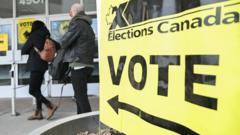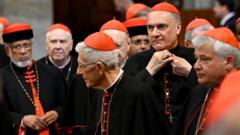Canada's elections on April 28, 2025, are marked by unprecedented challenges fueled by President Trump's trade policies. With the Liberals led by Mark Carney and the Conservatives under Pierre Poilievre in a tight race, the outcome will determine the nation's approach to economic and diplomatic crises.
Canada Faces Critical Election as Trump Influence Looms Large

Canada Faces Critical Election as Trump Influence Looms Large
Canadians head to the polls in a crucial election shaped by President Trump's tariffs, as the Liberals and Conservatives vie for leadership amidst economic uncertainty.
As the clock ticks down to Canada's critical election on April 28, 2025, voters are bracing for a pivotal moment shaped by global economic uncertainties and the looming presence of President Trump. With polls recently indicating a tight race, the political landscape is dramatically altered due to Trump's ongoing trade war and provocative remarks suggesting Canada's potential annexation as the "51st state."
The Liberal Party, now led by Mark Carney following Justin Trudeau's resignation in March, has surged in popularity, challenging the early dominance of the Conservative Party under Pierre Poilievre. Pre-election surveys showed Carney's Liberals narrowly edging out the Conservatives as public sentiment shifted in response to Trump's tariffs aimed at Canadian goods, causing significant economic peril in Canada.
This year's election sees additional parties such as the New Democratic Party, the Greens, and Bloc Quebecois vying for attention, though the primary focus remains on the two leading candidates. Carney, a seasoned financier and former central banker, has marketed himself as the only candidate capable of effectively confronting Trump while safeguarding Canadian interests. Poilievre, conversely, supports a more populist agenda and emphasizes smaller government and deregulation, but faces skepticism due to his perceived alignment with Trump.
As Canadians prepare to cast their votes, the stakes are particularly high with economic issues such as inflation and cost of living dominating voter concerns. To further complicate matters, Trump's recent comments on social media urged Canadians to support the candidate he perceives as a potential ally, which received backlash from both major parties, with Poilievre insisting on the sovereignty of Canadian voters.
With voting expected to occur across Canada's six time zones until 9:30 PM ET, the result of this election could reshape the national political landscape, influencing how Canada will navigate its relationships both domestically and with the United States in the years to come. The political narrative could pivot dramatically depending on whether the leadership can establish a strong foothold against external pressures, particularly from the Trump administration. As the election day unfolds, the world watches closely, anticipating the impact of today’s choices on Canada's future.






















